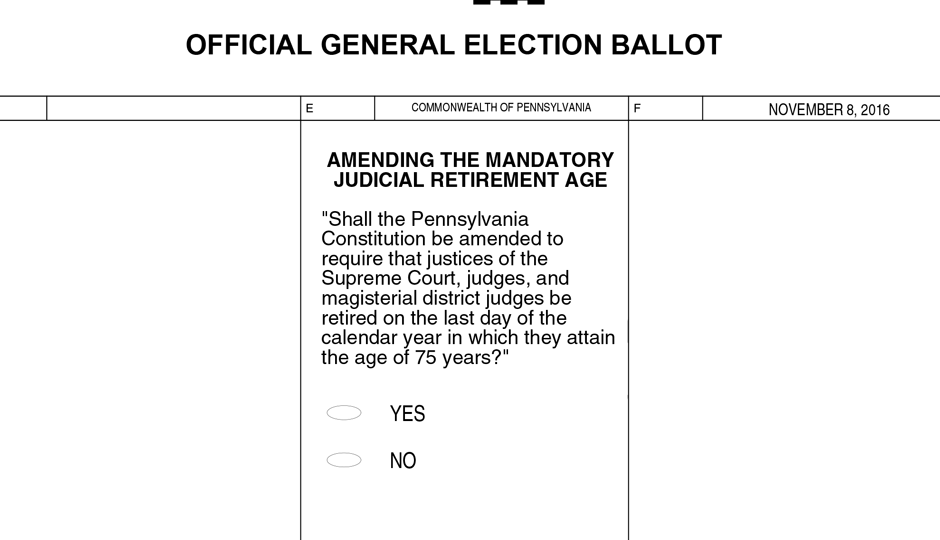How a GOP-Sponsored Ballot Question Could Help Philly

This question will be on the ballot next week. Republicans want you to vote YES — but that vote might end up being good for Democrats as well.
Next Tuesday, Philadelphia residents will get to vote for president and members of both the U.S. and state Senate and House. They’ll also have to vote on a controversial ballot question that would raise the retirement age for Pennsylvania judges to 75.
The controversy stems not just from its content, but its wording:
Shall the Pennsylvania Constitution be amended to require that justices of the Supreme Court, judges, and magisterial district judges be retired on the last day of the calendar year in which they attain the age of 75 years?
That wording has been challenged in court. Several petitioners are attempting to invalidate the question even now, a week before the election, because it reads as if the state is establishing a retirement age for judges. In actuality, there already is a retirement age of 70 for Pennsylvania judges — voters are really being asked if they want to raise it to 75.
A Franklin & Marshall poll found that when the wording is given as stated on the ballot, the measure passes. But when it’s explained that a YES vote would actually raise the retirement age from 70 to 75, the measure fails.
We actually voted on this issue in the April primary. The question at the time explained that a YES vote would raise the age for retirement from 70 to 75. Though Republican members of the legislature invalidated the question, it was too late to remove it from the ballot, so people voted: It failed 51 to 49 percent. Next week’s ballot question looks like it’ll pass, due to the different wording.
Republican state Senate majority leader Jake Corman wrote an op-ed in the Inquirer defending the question, but didn’t bother to mention that the question was not just “changing” the retirement age for judges, but raising it. The thinking is that Republicans want Thomas Saylor, the current chief justice of Pennsylvania, in office for five more years. If the ballot question is not implemented, he’ll have to retire on December 12th. Keeping Saylor on for another five years means the Republican would remain as chief justice until 2021, though he’d have to go through a retention election next year.
Why is 2021 important? That’s when the state will redistrict again after the results of the 2020 census. The state Supreme Court weighs in on any challenges to redistricting. Keeping the chief justice for another five years means there’s one Republican guaranteed to be on the court. That’s important for Republicans because Democrats swept the election for three judicial seats in the 2015 elections; the court now has five Democrats and just two Republicans. Democrats will control the court for the next redistricting, but if the vote passes Republicans will have the chief justice in their party at least. If the ballot question passes, it will also delay the liberalization of the courts in the Philadelphia suburbs. Those areas are becoming more heavily Democratic, but judges won’t have to retire at 70 if it passes.
But there’s thinking among some local Democratic political insiders that this question, which seems likely to pass, will end up helping Democrats in the end. It will just take a while.
If the judicial retirement age is raised to 75, 59-year-old Debra Todd will get to serve until October 2032. Justices Kevin Dougherty and David Wecht, who won elections last year, will serve until 2037. That gives the Democrats three Supreme Court seats for the redistricting that will take place in 2031. Unless Republicans win the other four seats, Democrats will be in charge of any court challenges to redistricting in 2021 and 2031. (Justices face a retention vote every 10 years, but only one — Russell Nigro in 2005, in the wake of the “Bonusgate” scandal — has ever failed to win that vote.)
A victory for the ballot question would also allow Democratic lawyers and labor unions — which spent a ton of money getting three justices elected last year — to rest a little next year. If the ballot question fails, three seats will be up next year. If it passes, only one seat will be contested (which is currently held by an interim justice). Without the mayoral election on the ballot like there was last year, it will be much tougher to drive turnout in Philadelphia for those judicial seats in 2017.
You should vote no on this question. Though supporters will say otherwise, it’s intentionally worded in a way that will confuse voters, who should have all the pertinent information and be told directly that the ballot question is raising the retirement age, not establishing one. Whether or not the age should be raised — and there is an argument it should be, as people live longer — is a separate question.
But even a yes vote might lead to increased Democratic power in the state in the long run. And what’s good for state Democrats is usually good for Philadelphia.